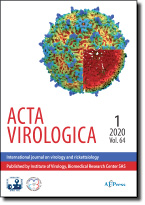Acta Virologica Vol.63, No.3, p.301-308, 2019
|
| Title: Efficacy and immunogenicity of a live L. acidophilus expressing SAD epitope of transmissible gastroenteritis virus as an oral vaccine |
| Author: R. XUE, Y. TIAN, Y. ZHANG, M. ZHANG, F. TIAN, J. MA, S. JIANG |
|
Abstract: Transmissible gastroenteritis virus (TGEV) causes great economic loss to swine industry worldwide. Vaccination is an important method to control the TGEV infection. In this study, a TGEV oral vaccine was generated by transferring a eukaryotic expression recombinant plasmid carrying the SAD (A and D antigenic sites of the S protein) epitope of TGEV into a swine-origin Lactobacillus acidophilus (L. acidophilus). In orally immunized BALB/c mice, the TGEV L. acidophilus oral vaccine induced significantly higher level of SIgA antibodies specific to TGEV compared with the mice immunized with a commercial inactivated TGEV vaccine and similar levels of IgG specific to TGEV as the inactivated vaccine. Furthermore, the TGEV L. acidophilus oral vaccine induced higher levels of IFN-γ, which suggested that the vaccine was able to induce immune response. In brief, this novel TGEV L. acidophilus oral vaccine could induce high levels of both mucosal and humoral immune responses, which has a potential to be used in the pig industries in the future.
|
|
| Keywords: transmissible gastroenteritis virus (TGEV); live L. acidophilus oral vaccine; SIgA antibody; IgG antibody; IFN-γ; IL-4 |
|
|
Published online: 09-Sep-2019
|
| Year: 2019, Volume: 63, Issue: 3 |
Page From: 301, Page To: 308 |
doi:10.4149/av_2019_310
|
|
 download file download file |
|
|
|
|
 download file
download file
